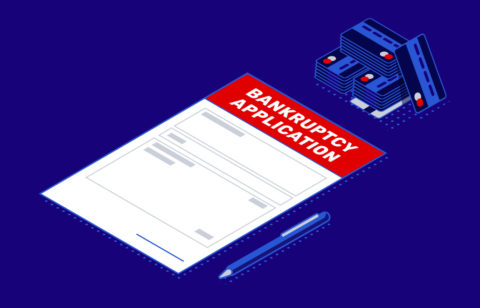You always hear financial advisers say that filing for bankruptcy could be a very bad idea. All the bankruptcy effects can really ruin your chances to improve your personal wealth – at least it will for the next decade or so.
If an individual or company declaring themselves bankrupt is a scary picture, imagine how terrifying it is for a whole city to do it. This is what Detroit, the most populous city in the Michigan state is going through. They have filed for bankruptcy because their local taxes is not enough to pay off the expenses of the city and their credit obligations at the same time.
On December 3, Judge Steven Rhodes of the federal bankruptcy court made a momentous decision to permit the city of Detroit to file for Chapter 9 bankruptcy. This will help the municipality restructure the $18 billion debt and financial obligations that they are accountable for. The said restructuring plan is expected to be submitted by March of 2014. While Detroit is not the first to declare a Chapter 9 bankruptcy, it still marks a place in history for being the largest municipality (so far) to go bankrupt.
What happened to Detroit to lead in bankruptcy
But what exactly led to this? Just as individuals are blamed for their irresponsible handling of money when they file for either a Chapter 7 or Chapter 13 bankruptcy, people are quick to point fingers at the local government officials. While we all want to blame them for the possible bankruptcy effects that it will cost us, why don’t we look at the facts first?
USA Today provided a couple of interesting and shocking facts about the challenges that the city of Detroit had to face leading up to their bankruptcy filing. Here are some of them:
-
The city’s revenue fell by 40% in 2012 compared to 1962.
-
Property taxes decreased by 19.7% in the last 5 years. This is due to the fact that the property value assessment went down by 70% in the last 50 years.
-
The city’s taxes are being taken from 9,700 workers that is meant to finance the benefits of 21,000 retired individuals.
-
Since 1950, the population in the city declined by 63%. Since 2000, the decline is noted to be 26%. From 1,849,600 in 1950, it is now down to 684,799. Again, this meant lower tax revenues for the city.
-
The June 2012 unemployment rate is 18.3%. Based on the Bureau of Labor Statistics, the national average at that time was only 8.2.
-
Since 1970, the employed residents in the city declined by 53%.
-
Detroit’s negative cash flow is expected to reach $198.5 million in the fiscal year of 2014 (at least if nothing will change from their present financial predicament).
-
The long term debt that the city accumulated is between $18 to $20 billion.
-
The city’s liabilities are as follows: pension at $3.5 billion and health care at $5.7 billion.
-
There are only 370 functioning street lights in one square mile in Detroit. Cleveland has 812 while St. Louis has 785.
-
Fire incidents in the city is between 11,000 to 12,000 every year for the last decade.
-
Local law enforcement response averages to almost an hour. The national average is 11 minutes.
-
There are 78,000 abandoned structures in the city and half of the parks have been closed since 2008.
All in all, the city really had no chance of surviving. While bankruptcy is never a good debt relief option, there are instances when you just have no choice. Let us paint a picture of what the city must have been like in the past few years.
First of all, with the low income being generated from taxes, the local government was unable to take care of the whole city. Government employees are probably not compensated well or are already functioning with a skeleton staff. This leads to poor service being given to its local residents. This could have led to people leaving the city altogether. With people leaving and none or only a small percentage of new residents coming in, the chances of the city increasing their revenues will be dismally small. Without the residents, the city will not attract businesses to set up shop.
All of these will only spiral downwards and there is nothing that the city can do to save itself. Hence, the bankruptcy declaration.
Effects that you may feel after the Detroit bankruptcy
In truth, it is hard to analyze how this could have been prevented. Just like some people have no choice but to file for bankruptcy, certain situations may have been out of the city’s control. These uncontrollable factors only placed the city under more financial stress until everything was too late.
But while we understand that the financial situation is too bleak to not be granted bankruptcy, it does pose one question: how will this affect us? Just like the losses of creditors after bankruptcy is passed on to other consumers, someone has to pay so the national economy will not go under after Detroit’s Chapter 9 bankruptcy takes effect.
NBCNews.com published an article that cites a few bankruptcy effects that consumers could feel.
-
Pension liabilities may be cut back. Judge Rhodes seem to imply that the city’s pension debt to local retirees is just like any other type of debt – so the guarantee to pay this is not firm. The same is true for health benefits.
-
An estimate of 100,000 creditors will all feel the distributed pain of the restructuring that the city will go through in lieu of the bankruptcy. Leading in the line are UBS and the Bank of America.
-
Investors in the city’s municipal bonds may have to accept pennies for every dollar invested. This can generally affect the confidence of investors nationwide as it could shake their confidence in the security of municipal bonds. City halls may have to dangle high interest rates to bring be more appealing to investors.
-
State taxes may have to shoulder some of the costs to help the city of Detroit back on its feet. If the State of Michigan is not financially stable on its own, it might end up going into deficit too.
-
Art collections that the city owns may have to be sold to help shoulder some of the payments that they have to make. On a positive note, art collectors feel that this might be worth billions.
If the restructuring is approved next year, the city can start on a clean slate as the creditors and other casualties of the bankruptcy effects walk away to lick their own wounds. The revenues that the city will generate may not be enough to support the city just like in its heyday but the goal will be to market the city so people and businesses will start moving in. That means the city will seriously have to revamp their service and the security in their streets.
How to protect yourself from Detroit’s bankruptcy aftermath
If you are not living in the city of Detroit and you feel that you will not be affected, well guess again. As we mentioned, the bankruptcy effects of the city will reach you – eventually. It will change your perception about bankruptcy and how it can affect individuals, businesses and even cities.
While people from other states may not feel much of the repercussions of this event, you need to remember that there are a couple of lessons here.
-
The national economy has yet to recover fully from the financial hardships of the recession. You may want to stay vigilant to ensure that you will not be left unaware and thus unprepared.
-
The need to set up your future to be financially stable is more important than ever. Start saving and invest your money. This is the only way that you can secure your finances – by setting up an emergency fund and having more than one source of income.
-
Make smart choices about your money. Nobody is exempt and you need to learn how to make smart choices when it comes to financial transactions. Do not assume that things will always go up. Be prepared for the chances (or possibility ) that it will go down.
All of these lessons point toward proper financial management. Make sure that you learn the right habits before it is too late.





